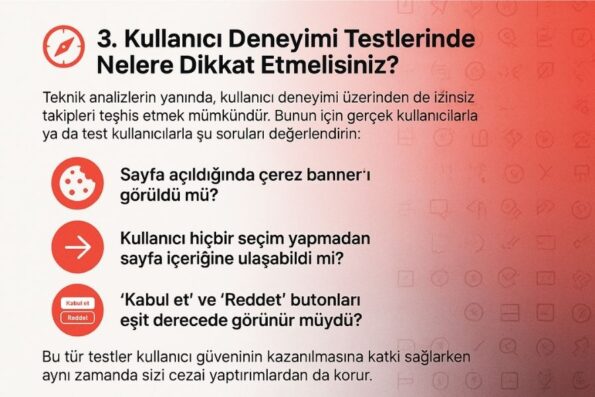When you browse the internet, you often leave traces behind without even realizing it. Ads follow you across sites, and profiles are created based on your behavior. So, within this entire digital surveillance system, are you legally safe from systems that track you without your consent? At the heart of this question lies the concept of “unauthorized tracking.” 🔍
Websites use various cookies when collecting user data. However, when some of these cookies are used without the visitor’s explicit consent, this clearly violates data protection regulations like the KVKK and GDPR. Unauthorized tracking not only creates ethical issues, but also carries consequences such as significant fines, brand damage, and the loss of user trust. 😟
In this article, we will cover in detail what is unauthorized tracking, which types of cookies fall under this category, how companies are affected by this situation, and what risks they face under the Personal Data Protection Law (KVKK). We will also explain, with concrete examples, what needs to be done for legal compliance and how technical measures can be implemented. Because in the data age, trust begins with consent. 🛡️
İçindekiler
ToggleWhat is Unauthorized Tracking? The Dark Background of the Concept
One of the most insidious threats users face in the digital environment, unauthorized tracking, is a data breach that is invisible but has a very serious impact. Simply put, it is the monitoring, recording, or analysis of an individual’s online activities without their explicit consent. This tracking is often done through invisible tools such as cookies, pixel tags, and fingerprint identifiers. While a user navigates a website, dozens of different tracking mechanisms may be running in the background—even without their consent. 👁️🗨️
The most common form of unauthorized tracking is the installation of third-party cookies, focused on advertising and analytics, in the browser without any prior warning or option. This situation constitutes a violation of Articles 5 and 6 of the KVKK and Articles 6 and 7 of the GDPR. This is because personal data cannot be processed without the explicit consent of the data subject. Such unauthorized processing, such as for ad targeting, behavioral profiling, or location tracking, triggers legal obligations.
The dark side of the concept here emerges not only in the collection of data but also in the deduction of an individual’s digital identity by matching this data with other platforms. This situation becomes a problem beyond privacy: companies are now starting to predict not only what you click on, but also what you think, what you plan, and even what you prefer. 🧠
While unauthorized tracking is still considered a “gray area,” especially for companies operating in the advertising technology space, regulatory frameworks like the KVKK and GDPR have clarified these gray areas. Using “cookie walls,” assuming consent, or silent consent methods are no longer acceptable. Providing the user with explicit, freely chosen, and differentiated (mandatory or optional) consent is mandatory.
Therefore, unauthorized tracking is not just a technical issue; it is a critical area of responsibility in terms of ethics, legality, and brand reputation. Therefore, organizations should: It is now essential for them to make their cookie policies transparent, provide real control to the user, and switch to configurations that minimize tracking.
🔍 What Does “Tracking Without Consent” Really Mean?
Many users think, “I didn’t give cookie permission, so they’re not tracking me,” but that’s not the case at all. Tracking Without Consent refers to data collection and analysis processes that occur without the user being informed, without explicit consent, or by manipulatively presenting the consent option. The issue here isn’t just the dropping of a cookie; the user’s behavioral profile is created, matched with their past actions, and transferred to other platforms. This clearly violates both the KVKK and the GDPR.
Even more concerning is that some websites actually use advertising or analytics cookies disguised as “essential” cookies. Users often fail to recognize this distinction in long, technically jargon-filled text. 👁️🗨️
Transparency, free consent, and a separate cookie structure are the cornerstones for preventing unauthorized tracking. By restructuring your website’s data collection processes with these fundamental principles, you can eliminate legal risks and strengthen your visitors’ trust.
🧭 Where Does User Data Go?
While things may seem simple to someone visiting your website, dozens of different third-party data collectors may be running in the background. User clicks, location, device information, screen resolution, and even mouse movement can be tracked and sent. So, where does this data go? Answer: Ad networks, data brokers, analytics companies… And often without the user knowing about it!
This data flow is considered a personal data transfer under the KVKK and is subject to the user’s explicit consent. Sharing data without informing the user is a clear violation. 🌐
Therefore, review both your technical infrastructure and your cookie policy: are third-party cookies clearly marked? Can the user disable them? If the answer is “no,” you should immediately take proactive measures against unauthorized data transfer.
🛑 Is “Silent Consent” Valid?
No, not anymore! Just because the user doesn’t click a button, stays on the page, or leaves the site doesn’t mean they’ve given consent. Such methods are considered invalid under the GDPR and KVKK. In other words, an approach like “the user stayed on the page, so they consented” is not only unethical but also carries legal risks.
Many sites continue to implement this method indirectly: for example, the “accept” button is prominent, while the “decline” or “manage preferences” option is grayed out or hidden. This constitutes manipulative consent. 🧠
Modernize your consent processes. A “double-layered consent system” allows users to manage both mandatory and optional cookies separately. This way, not only legal compliance but also user loyalty is built.
⚠️ What Are the Legal Consequences of Unauthorized Tracking?
One of the most common mistakes is: “We’re a small business, we won’t get fined.” However, KVKK fines have been applied to many organizations, from individual websites to large e-commerce brands. The total amount of administrative fines imposed in 2023 due to unauthorized surveillance exceeded 50 million Turkish Lira.
These fines are imposed not only for “data breaches” but also for reasons such as incomplete information, lack of explicit consent, and failure to distinguish between mandatory and voluntary data. Furthermore, not only the fines but also the brand’s reputation are damaged. ❌
To protect yourself and your business from these risks: Update your cookie policy page with clear and simple language, add preference management modules, and use tools that prevent unauthorized tracking. Remember, a visitor’s trust is more valuable than your entire advertising budget.
How to Control Cookies with Google Tag Manager? A Technical and Legal Approach
How Do You Know If Your Visitors Are Being Tracked?
Understanding whether visitors are being tracked without permission on your website is not only a legal requirement but also a critical step in terms of ethical responsibility and customer trust. So, how can you, as a website owner, detect this? Unauthorized cookies or third-party tracking codes often run in the background and can be difficult to detect. Therefore, regular technical audits and the use of cookie scanners and scanning tools are crucial. Furthermore, if cookies are placed without explicit user consent, this automatically constitutes a violation of the KVKK and GDPR.
Simply relying on technical tools alone may not be enough. Some tracking techniques involve manipulative systems that pretend to have obtained user consent. Therefore, the transparency of consent processes should be evaluated through both manual checks and user experience testing. Answering questions like, “Did the cookie banner appear, but did the site open without selecting anything?” can reveal whether your site is subject to unauthorized tracking. 🕵️♀️
🔍 1. How Do You View Cookies in the Browser?
Web browsers were the first simple tools that enabled cookie tracking. For example, if you’re using Chrome, you can right-click on any website, select “Inspect” > “Application” and then access the “Cookies” section. Here, you can see which cookies have been set by both domain and content.
If the user hasn’t provided any consent, but you see third-party advertising cookies, this constitutes a serious violation. 🧾
Regularly checking this step is critical for monitoring the current status of tracking codes installed on the site. Additionally, testing your site from different devices can uncover tracking patterns that might have been overlooked.
🧪 2. What Data Do Cookie Scanning Tools Provide?
Beyond manual methods, cookie scanners offer much more comprehensive analysis. For example, tools like Cookiebot, OneTrust, Didomi, and CookieServe don’t just list cookies; they also tell you what category they are in, how long they’ve been stored, and which party deposited them. This makes it easier to distinguish between optional and mandatory cookies.
In some cases, a plugin or third-party application on your site may be collecting data without permission. These tools allow you to detect this and eliminate risks early. 🛠️
These tools also often map tracking traffic, showing which countries the data is transferred to. This is important in terms of data transfer and international risks.
🧭 3. What Should You Pay Attention to in User Experience Tests?
In addition to technical analysis, it is also possible to detect unauthorized tracking through user experience. To do this, evaluate the following questions with real users or test users:
- Was the cookie banner visible when the page opened?
- Was the user able to access the page content without making any selections?
- Were the “Accept” and “Decline” buttons equally visible?
The answers to these questions will help you determine your system’s performance. It reveals whether the consent process involves manipulation. 😕 If the user can consume content without making a choice, the system is vulnerable to unauthorized tracking.
Such tests help build user trust while also protecting you from criminal penalties.

⚠️ 4. Why Third-Party Code Is Dangerous?
Every third-party service you integrate into your website—whether it’s a live support tool or an ad network—is a potential source of intrusive tracking. In particular, if user consent is not obtained before these codes are uploaded to the site, data processing will begin automatically.
Even if some codes don’t leave cookies, they can still collect data such as the user’s IP address, screen resolution, and browser language. This constitutes personal data processing under the Personal Data Protection Law (KVKK). 🔍
Therefore, check any third-party code you integrate into your cookie manager and, if possible, activate it only after consent, using trigger systems (e.g., GTM conditions).
What are the Penalties for Legally Unauthorized Tracking?
Cookies used on websites allow users to track their digital behavior and collect data for many different purposes, such as marketing, analytics, and security. However, processing this data without the user’s explicit consent is against regulations such as the KVKK and GDPR. Unauthorized tracking; It’s not only an ethical issue, but also a serious legal risk that can result in financial and reputational damage. When institutions fail to take adequate precautions, penalties become inevitable.
In Turkey, under the KVKK, unauthorized processing of personal data may result in both administrative fines and criminal liability. For example, if data controllers fail to clearly inform users about the data being processed through cookies and begin tracking without consent, the Personal Data Protection Board can impose administrative fines of up to 1,000,000 TL. 🧾 In European Union countries, GDPR violations carry a fine of up to 4% of annual global turnover. Therefore, unauthorized tracking shouldn’t be viewed as just a minor technical deficiency; On the contrary, it should be considered a critical threat to the company’s digital sustainability.
⚖️ 1. Sanctions for Tracking Without Explicit Consent According to the KVKK
According to the KVKK, the explicit consent of the data subject is required for the processing of personal data. The collection of data such as IP address, behavioral analysis, and session information through cookies is also considered within this scope. If this data is collected without the user’s explicit consent, an administrative fine will be imposed pursuant to Article 18 of Law No. 6698. As of 2025, the minimum fine for this fine will start at 100,000 TL.
Furthermore, the Board may conduct an investigation upon complaint or on its own initiative. If your business’s cookie policy or consent process is found to be deficient, you may face not only a fine but also additional sanctions such as data deletion or suspension of operations. ⚠️
💶 2. Is Unauthorized Tracking Considered a Crime Under the GDPR?
The European Union’s General Data Protection Regulation (GDPR) mandates the “first inform, then obtain consent” principle when using cookies. If data is collected without explicit user consent, this is directly considered “unlawful data processing.” Under the GDPR, such violations can result in fines ranging from 2% to 4% of a company’s annual global turnover.
For example, large companies like Amazon and H&M have been fined hundreds of millions of euros in this area. This demonstrates the vital importance of companies of all sizes complying with these rules. 🌍
🧾 3. Real Personal Data Protection Law Fines Issued in Turkey
Since 2016, the Personal Data Protection Law (KVKK) has fined numerous companies for various data processing violations, including cookies. For example, in 2021, a news website was found to have installed cookies on visitors without their consent. The Board imposed a fine of 900,000 TL on this grounds. Another e-commerce platform was subject to criminal action for transferring user data without consent due to third-party advertising cookies.
These examples show that tracking activities conducted without consent are considered not just a technical error, but a serious legal liability. 📉
🚫 4. Other Sanctions You May Face Besides Administrative Fines
A fine may be the most visible consequence; however, the KVKK and GDPR don’t just impose monetary fines. It may also:
- Decide to suspend data processing activities
- May request the reconfiguration of relevant systems
- May require you to issue a public apology
- May involve you in a guidance or audit process
Users can also file individual lawsuits and claim for moral damages due to unauthorized tracking. This can damage your brand’s reputation and disrupt your digital strategy. 🛑
Dynamic vs. Static Cookie Policy: Which Structure is More Suitable for Your Site?
Legal and Reputational Risks Faced by Sites with Unauthorized Tracking
Websites that continue to collect personal data without explicit consent face not only a technical deficiency but also a serious legal and reputational crisis. Data protection regulations, such as KVKK and GDPR, in particular, can impose sanctions such as administrative fines, data processing bans, and public disclosure obligations on institutions for any data processed without explicit consent. These fines can reach thousands or even hundreds of thousands of lira. ⚖️
However, this risk, which is not limited to legal sanctions, directly impacts the value a brand carries in the digital environment. Users can lose trust in a brand when they learn that their personal data has been used without permission, leading to customer loss, reduced engagement, and reputational damage. So, not respecting privacy not only harms the law, but also your digital brand. Therefore, preventing unauthorized tracking should be a priority not only for legal obligations but also for the protection of digital reputation.
Is Unauthorized Tracking Considered a Crime Under the KVKK and GDPR?
Unintentional use of cookies is considered unlawful processing of personal data under both the KVKK and GDPR. If a website sets a cookie without obtaining explicit consent from the user, this directly constitutes a data breach. According to the KVKK, administrative fines can be imposed for such violations under Article 12 of Law No. 6698. In Europe, companies subject to the GDPR can face fines of up to hundreds of thousands of euros. Therefore, unauthorized monitoring is not just a technical negligence; it is a serious legal liability.
Companies Facing High Fines: Real Case Examples
Significant fines have been issued in recent years in both Turkey and Europe for cookie policy violations. In 2022, Meta was fined €390 million under the GDPR. In Turkey, in 2023, an e-commerce site was fined 900,000 TL by the KVKK for lack of information and conducting behavioral advertising without user consent. These examples clearly demonstrate the importance of cookie compliance not only for large companies but also for SMEs. A missed banner can open the door to a major risk.
Why Are User Trust and Brand Loyalty at Risk?
Tracking without visitors’ consent is perceived as an invasion of their privacy. Users attach great importance to data security, especially in sectors like finance, healthcare, and e-commerce. If a website gives the impression that it is “secretly” collecting data, this can lead to a loss of trust in the brand. Even a few negative reviews or social media posts can damage a brand’s digital reputation. However, a transparent cookie policy conveys to the user the message, “I respect your data.”
How Does Reputation Loss Affect Digital Performance?
Sites that place unauthorized cookies or collect data without explicit user consent are not only at risk for legal reasons but also for digital performance. Starting in 2024, Google increased browser restrictions against privacy-violating practices. Such sites could suffer both a decline in search engine rankings and a lower trust score on advertising platforms. Furthermore, users may be hesitant to return to these sites. All of this negatively impacts SEO scores, ad ROI, and user loyalty, directly undermining the digital side of the business.
Conclusion: Preventing Unauthorized Tracking is in Your Hands – Take Action Now!
Using cookies on websites is much more than just a technical detail. It’s now a strategic area that requires a delicate balance between brand reliability, legal compliance, and user experience. Unauthorized tracking isn’t just a violation of the KVKK or GDPR; it’s also an invisible threat that undermines visitors’ trust in your brand. 🔍
However, it’s possible to turn this threat into an opportunity. With clear and understandable consent processes, up-to-date privacy policies, auditable cookie management systems, and infrastructures supported by technical tools, you can build a digital structure that’s both compliant and user-friendly. So, you can do what’s right not only legally but also ethically. ✅
Remember this: User data is a right, and unauthorized access is a violation. Acting with this awareness not only reduces criminal risks, but also strengthens your brand with the values of transparency, responsibility, and digital ethics. 🔐
📞 Now It’s Your Turn: Build a System Compatible with Adapte Dijital!
Need support regarding your website’s cookie policy, explicit consent mechanism, or Google Tag Manager configuration?
👉 Fill out our “Let Us Call You” form and our experts will immediately create a personalized roadmap for your KVKK and cookie compliance process.
⏳ Don’t waste time. Digital adaptation doesn’t tolerate delays.
📌 Adapte Dijital – Let’s manage your security and reputation together.
You can visit the Red Makine website, where we implement the Consent Cookie Privacy Management Model, by clicking the link.




